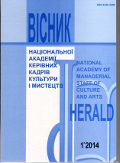CHARACTERISTICS OF PEDAGOGICAL COMMUNICATION AND ITS IMPORTANCE FOR CORPORATE CULTURE DIRECTOR
DOI:
https://doi.org/10.32461/2226-3209.1.2014.137909Keywords:
corporate culture, pedagogical communication, training, future director, valuesAbstract
Becoming of modern trade education needs creation of socialpedagogical terms of future stage-director personality humanizing, because it is argued that artistic professionals are powerful potential of development of our society.
Modern science abandons oneself all anymore to the idea, that communication as an objective type of vital functions of every personality, comes forward as an original art, where there are rules, features and secrets. Every specialist must know all these for the activity optimization.
Stage-director is one of most difficult, most dynamic professions, we mark – pedagogical professions.
Its complexity associates with its high requirements that relate to the director, manager, teacher because of accelerating scientific and technical progress, the growth of information and the considerable costs of mental, psychological energy in creative and educational activities.
The role of communication in director's work is great because it has the ability to affect change in the structure and substance of social actors (students) to human socialization, formationof personality.
Communication is the process of interconnection and interaction between social entities (groups of persons), where there are the exchange of information, activities, mood, experience, abilities and skills.
Among the variety of types of communication we can allocate teacher communication. On our opinion that teacher communication is a particular type of human communication (eg, in comparison with a business, family communication, etc.). It is characterized by common features of communicative interaction, and highly specific, inherent in the educational process.
Also we can add to this that the pedagogical dialogue is a form of academic cooperation by optimizing learning and personal development of students. Thus, pedagogical communication is a multifaceted process of establishment and development of communication, understanding and collaboration between teachers and students.
On our opinion that it is aimed not only on the interaction of learners for their personal development, but is central to most educational systems for organizations of learning and the formation of the creative skills basis. Thus teacher
communication is characterized by at least threefold focus: the academic interaction, students (their current state, promising lines of development) and the subject of learning. At the same time, teacher communication is defined also with triple orientation of its subjects: personal, social and intuitive.
SPT, while working with students on the development of a teaching material, always directs its result to all the participants in the audience and, conversely, working with a group affects everyone. Therefore, we can assume that the uniqueness of pedagogical communication, which is a combination of these characteristics, can be expressed in organic combination of elements of student-centered, socially oriented and visually based learning.
While teaching communication tasks are given and are implemented, the main goal is to transmit knowledge and encourage learners.
A role of pedagogical communication in stage-director work is enormous, as it has the opportunity to influence on the change of structure and essence of social subjects (students), on socialization of human being and its socialization.
It is possible to assert that pedagogical communication is one of types of professional communication. There are different points of view on the problem of function of pedagogical communication and determination of its basic goal.
In the process of pedagogical communication communicative tasks can be realized – and the main goal is to pass knowledge and induce those, who studies to the corresponding.
Thus, the work of teacher interaction is a process where teacher implements and approves own potential strength and ability, and also develops himself. Modern art education needs comprehensively trained teachers and specialists who have professional expertise and know how to express the deep essence of his personality to create optimal social and educational environment for the development of future directors as professionals and for humanizing their personality.
Modern artistic education needs the all-round prepared teachers and specialists that have thorough professional knowledge and are able to express deep essence of the personality for creation of optimal social-pedagogical terms for development of future stage-directors as the business professionals and for humanizing of their personality.
The level of relationships between students and teachers depends on the effectiveness of training future specialists.
It is clear that it can make only the one who has skills, and is able to convey the richness of human culture to the students.
Thus, for forming of corporate culture of stage-director the professional activity requires maximal patience, persistence, sequence in actions, fundamentalness, in its connect with tactfulness and flexibility.
Downloads
Published
Issue
Section
License
Authors who publish with this journal agree to the following terms:
1. Authors retain copyright and grant the journal right of first publication with the work simultaneously licensed under a Creative Commons Attribution License International CC-BY that allows others to share the work with an acknowledgement of the work's authorship and initial publication in this journal.
2. Authors are able to enter into separate, additional contractual arrangements for the non-exclusive distribution of the journal's published version of the work (e.g., post it to an institutional repository or publish it in a book), with an acknowledgement of its initial publication in this journal.
3. Authors are permitted and encouraged to post their work online (e.g., in institutional repositories or on their website) prior to and during the submission process, as it can lead to productive exchanges, as well as earlier and greater citation of published work (See The Effect of Open Access).


